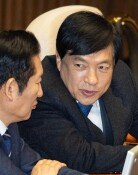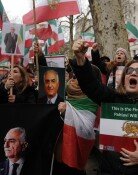[Editorial] Era for inter-Korean diplomatic concert
[Editorial] Era for inter-Korean diplomatic concert
Posted July. 27, 2000 21:24,
South Korean Minister of Foreign Affairs and Trade Lee Jong-Bin and his North Korean counterpart, Paik Nam-Soon, had a historic meeting in Bangkok on July 26. Their talks signify the opening of a new era for inter-Korean diplomatic cooperation in the international community.
We are now about to close the curtain on a disgraceful period of inter-Korean diplomatic history, which was marked by mutual contempt and slander before the world despite the fact that the two sides represent the people of one and the same nation.
The Bangkok meeting between the two Koreas` foreign ministers confirms that Seoul and Pyongyang are now two equal members of the international community. It declared that `one nation with two systems` will be a new paradigm dominating the future of the Korean peninsula and the first concrete step towards reunification. It aims to realize a South-North confederation through mutual reconciliation and cooperation between the two sides.
The two Koreas will find many areas of international relations in which they can cooperate. For the first time in inter-Korean history, for example, they can work together to promote U.N. resolutions at the United Nation`s General Assembly in September supporting the June 15 South-North Declaration or peace and stability on the Korean peninsula, guaranteeing this through an international arrangement.
Channels of diplomatic communications may be explored for mutual consultations in regions where the two Koreas both have both diplomatic missions. It is also not unthinkable for one side to represent the other`s diplomatic interests in areas where only one Korea has a diplomatic mission.
It is our judgment that South-North diplomatic collaboration will have a significant impact on the international relations of the peninsula and its neighbors. The conflicting interests and ambivalent relations among the United States, Japan, China and Russia converge on the Korean peninsula. These great powers are also keen to exercise their respective influences over the two Koreas. North and South Korea`s conflicting interests have so far been significant variables in the four powers` diplomatic efforts. Now that inter-Korean diplomatic cooperation is in the works, the dynamics of the big powers` diplomacy regarding the peninsula will also have to undergo changes. The two Koreas will now be able to seize the diplomatic initiative to play a greater role in international developments on the peninsula and Northeast Asia.
The effects of the Seoul-Pyongyang diplomatic collaboration will greatly depend on North Korea`s success with its advance into the international community. This is the reason why Seoul has repeatedly made it clear that it will assist Pyongyang`s efforts to join such international organizations as the Asia-Pacific Economic Cooperation and the Asian Development Bank. For this reason, we wholly welcome North Korea`s admission into the ASEAN Regional Forum (ARF). ARF is a political and security organization with 20 member states. It requires its members to submit annual security reports. Pyongyang`s membership will be greatly conducive to the peace and security of the Korean peninsula. Diplomatic authorities of the two Koreas must make every effort to ensure that their collaboration will be a driving force behind the implementation of the the June 15 South-North Declaration.



![“잠만 자면 입이 바싹바싹”…잠들기 전에 이것 체크해야 [알쓸톡]](https://dimg.donga.com/c/138/175/90/1/wps/NEWS/IMAGE/2026/02/23/133404749.3.jpg)



